11th June 2025
This session was a first try at a theme night, any games first published last century. Eleven players joined in bringing some games stored from their younger years or trying something out of historical curiosity. It was nice to see a full table of options brought in by everyone and seven games made it onto the tables including push your luck, detective skills, competitive archaeology, evolving the best microbe and capitalism.
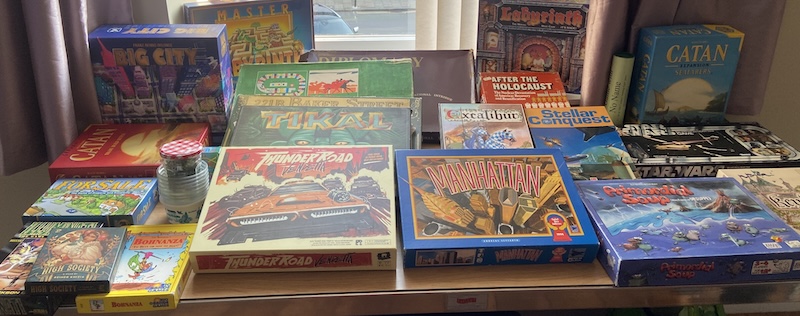
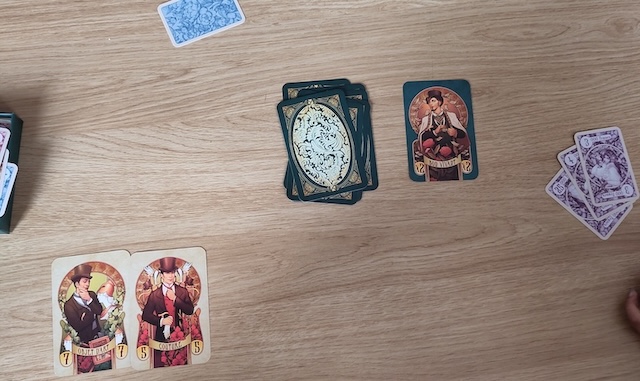
The night started with some shorter games, the first table chose 1995’s High Society already popular at club and on its eighth play, last seen in session 101. This time around, the game lasted much longer - right down to the last card to be auctioned! So everyone had points at the end of the game, but unfortunately Neil, who had a late start but faired well when everyone else had little money, forgot to keep any money so was ostracised and outcast. In the end it was a close run thing, with both Ian and Jeremy getting a tie and being seen as having the most class! But Jeremy just pipped it by having more cash in hand.
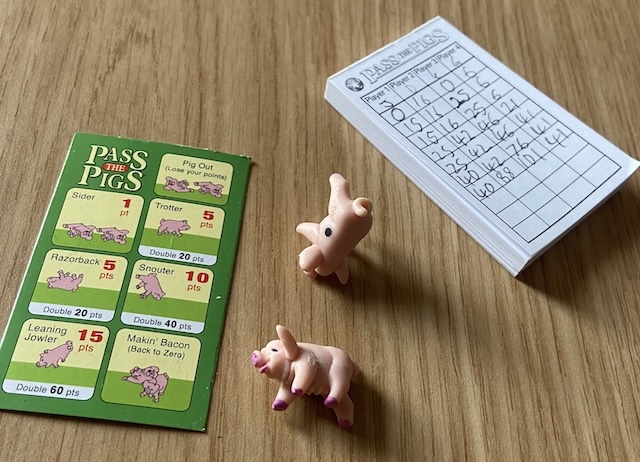
The other table started with 1977 classic Pass the Pigs. A very simple game, players roll two plastic pigs instead of dice and score different amounts depending on how they land with higher points for the more unusual positions like tipped onto a nose or ear - a “leaning jowler”. First to a total score of 100 wins, but your turn ends when you pass or roll a “pig out” which is one pig landing on either side. First time player Kathy J. steadily built up her score and held out against the risk takers James T. and Dave, though Graham W. had a strong streak on his final turn before he finally rolled a pig out just before reaching 100.
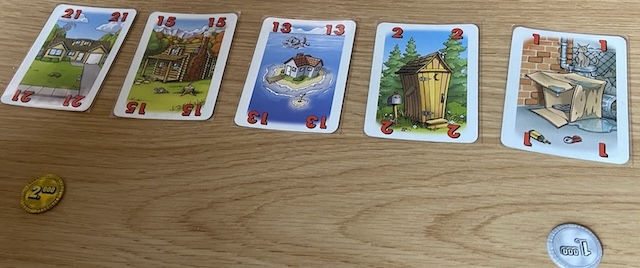
For Sale from 1997 was next up on the table. This was its ninth outing at club, first played in session 7. Played over two rounds, the first bidding to acquire property and the second to sell it again for the best prices. Early auction rounds saw some competitive bidding and a few players running out of funds and having to settle for lower value properties in later rounds. Graham W. with his selection of mostly middle priced properties was most successful in the selling rounds and comically the wet cardboard box managed to sell for more than the draughty cave.
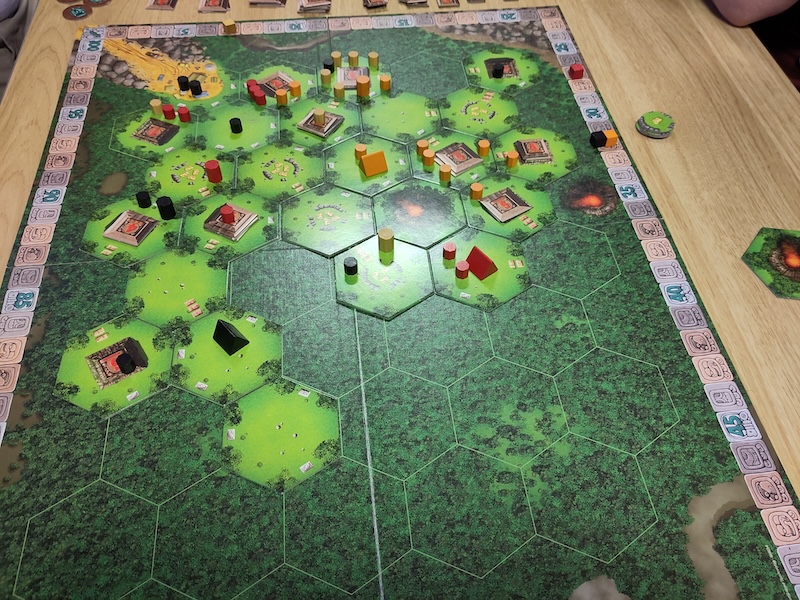
Players then rearranged across the tables to start some longer games. Kathy J. taught 1999’s Tikal, another returning game on its third club play, originally seen back in session 2. Although there are only two main ways to score points, area control of the temples hidden in the jungle or digging up and making sets of treasure, by halfway through the new players had realised how crucial the ten action points per round were for choosing where to focus their party members before a volcano scoring round started.
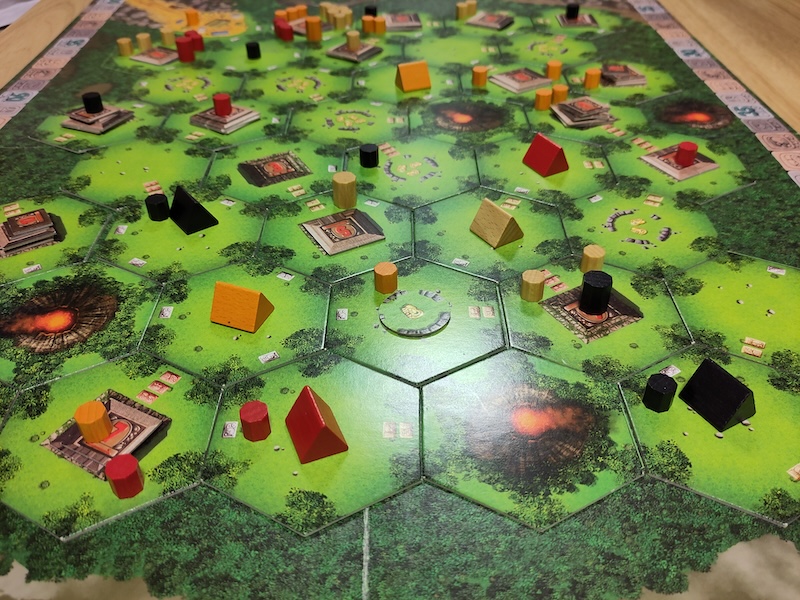
It was very close between Dave and James T. who managed some good temple discovery and moving their team in for a take-over at the right time without neglecting the treasure sets. Kathy J. suffered the teachers curse and was left in the dirt of her few barely excavated temples and paltry baubles.
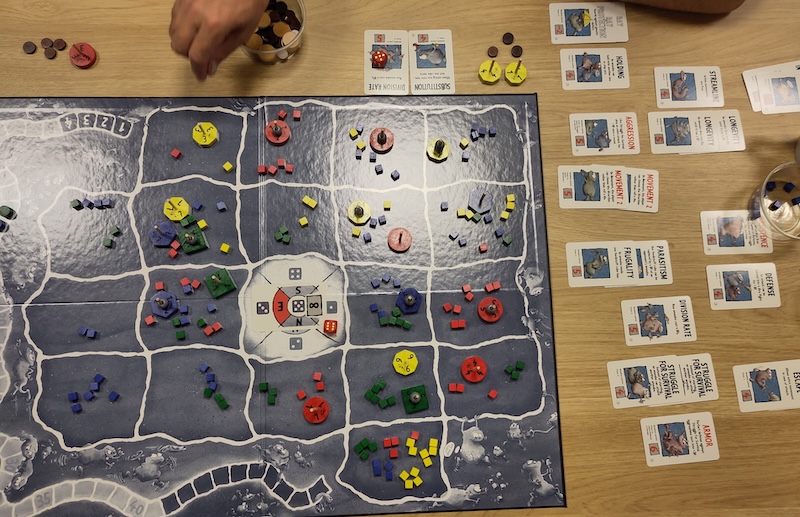
Iain taught his table of four Primordial Soup from 1997. This is a game about evolving your amoeboid species faster than everyone else to reach 42 points (the meaning of life after all). You start with two proto lifeforms each on a board rich in food. Each player takes turns allowing their amoeba to drift with the currents or try and move. Which ever spot you end up in you have to try and feed on 3 different colour food cubes (but not the colour of your species), if successful you poop 2 cubes of your colour, if unsuccessful you starve and take a damage. After this each player gets to buy a new trait for their species with BP (biological points) and then to reproduce. You get victory points based on the number of amoeba and number of traits. But beware, the environment changes and can impact those who have too many traits, and those with more amoebas might find eating more difficult. Another big part of this game is watching the turn order - based on victory points - as being in front allows to choose traits and reproduction first, but you get to eat last! Also, being last might mean leap frogging others on the score track (if you can keep up).
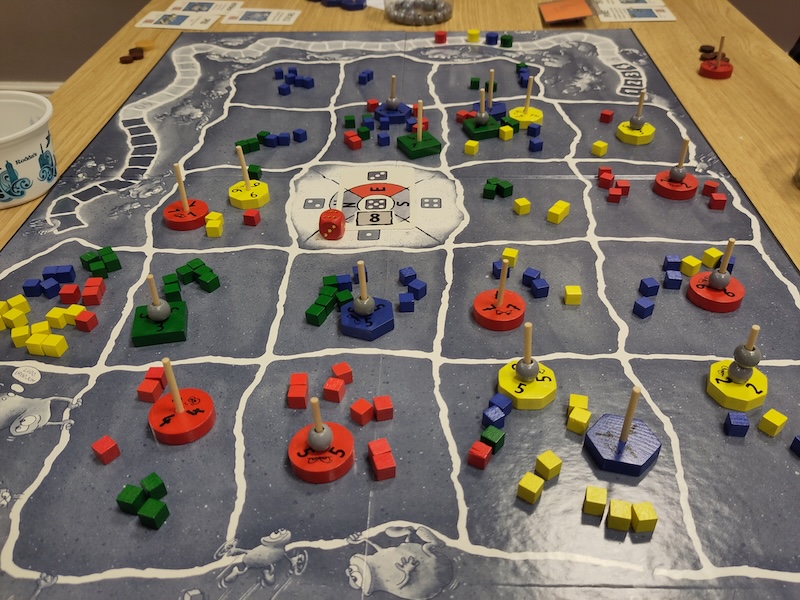
In this game, Iain showed off his knowledge of reproduction by specialising in spawning! Jeremy and Neil tried growing tentacles to allow collection of food, whilst Graham tried being very agile and speedy. With the different phases in each round and what to spend your BP on, it made for an interesting challenge with multiple paths to victory. Jeremy’s amoeba concentrated on gaining traits and having enough BP to ward off the environmental effects and ended up choosing the aggressive trait to enable eating some of the competition as food was getting somewhat scarce in places. This tactic meant he leap frogged into the lead for a win in this game, with Neil and Iain very close behind, and Graham just trying to catch up.
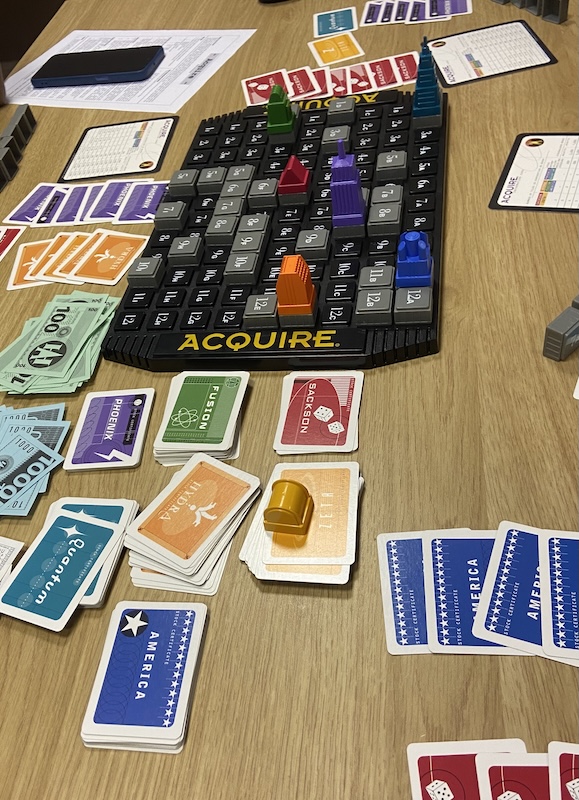
Taking the prize for oldest game of the night was Acquire from 1964. Acquire is probably one of the oldest “euro games” and despite being sixty years old few would realise that when playing the game (especially with the various reprints over the decades, of varying polish and excitement). This is not a stock game, really it’s all about massaging the odds so that things will go your way. There is a substantial element of chance, since the game is drive by placing tiles and players have a hand of six to choose from (randomly replaced at the end of their turn). Certainly a “better” player will try to minimise their risk of bad titles, but you can only make your own luck so much in this game. That aspect alone is where Acquire shows its age, coupled with a end-game play where typically one player is locked out and left to make uninteresting moves. The mergers are exciting when they happen, to see players gain lots of money (to sink into other companies) and see the board slowly engulfed by “safe” companies. The decision to hold off buying stocks, keeping your precious money free to invest later, is vital to success; in Acquire running out of money is the worst situation to be in and mergers are the only way to get money.
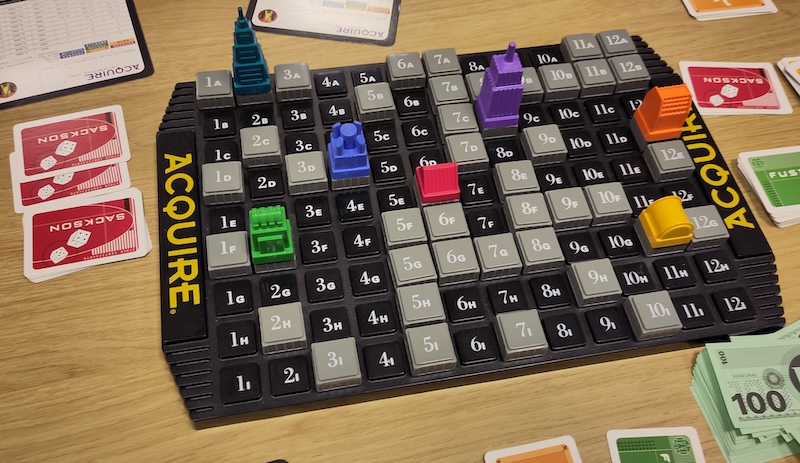
Three players took up the challenge and experience did win the day, but that was helped by two very lucky tile draws. In the early game, taking the major and minor bonus payouts in a merger and in the mid-game control of which way two companies merged (cutting the third player out). With that merged company off the board, the two players with stocks kept them and restarted the same company not once, not twice, but three times – each time netting major and minor merging bonuses.
In the spirit of retro night, we even played with the original paper money.
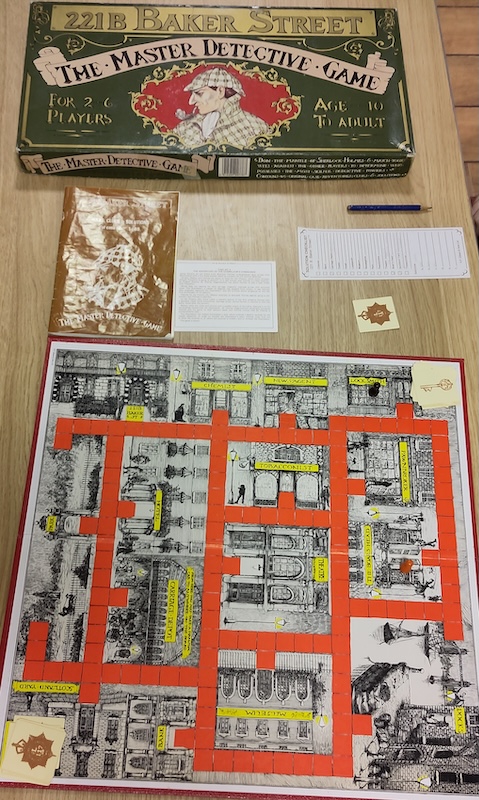
As the other budding archaeologists had left to get some sleep, Kathy and Darren tried a quick run of 1975’s 221B Baker Street: The Master Detective Game. Kathy suggested a speed version of the game by ditching the dice to move around the board and collecting a clue every turn instead. Darren chose “The Adventure of the Chameleon’s vengeance”, a mystery set in the theatre with an escaped convict out to get his revenge on Holmes during his violin solo at the concert. The aim to work out who the notorious Chameleon had disguised himself as, and what and where his surprise for Holmes was. Most of the clues were a bit cryptic or sounds like, with the answers split into chunks of words that could be assembled e.g. Ex - plo - sieve. Kathy went back to 221B first to declare her answer which was close but not quite right on the location, giving Darren a chance but he made the same mistake. The Chameleon had disguised himself as Inspector Lestrade and hidden explosives in Holmes’s violin case.
Session 105 is the 25th June. Back to normal, any games that people want to suggest and try, perhaps time to share a new game from a recent convention.
- Total Session Attendance: 11
-
Board Games: